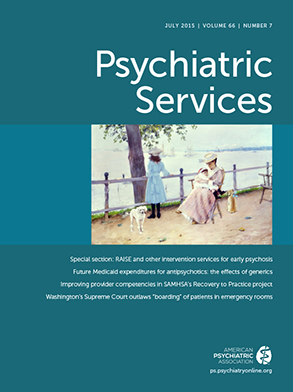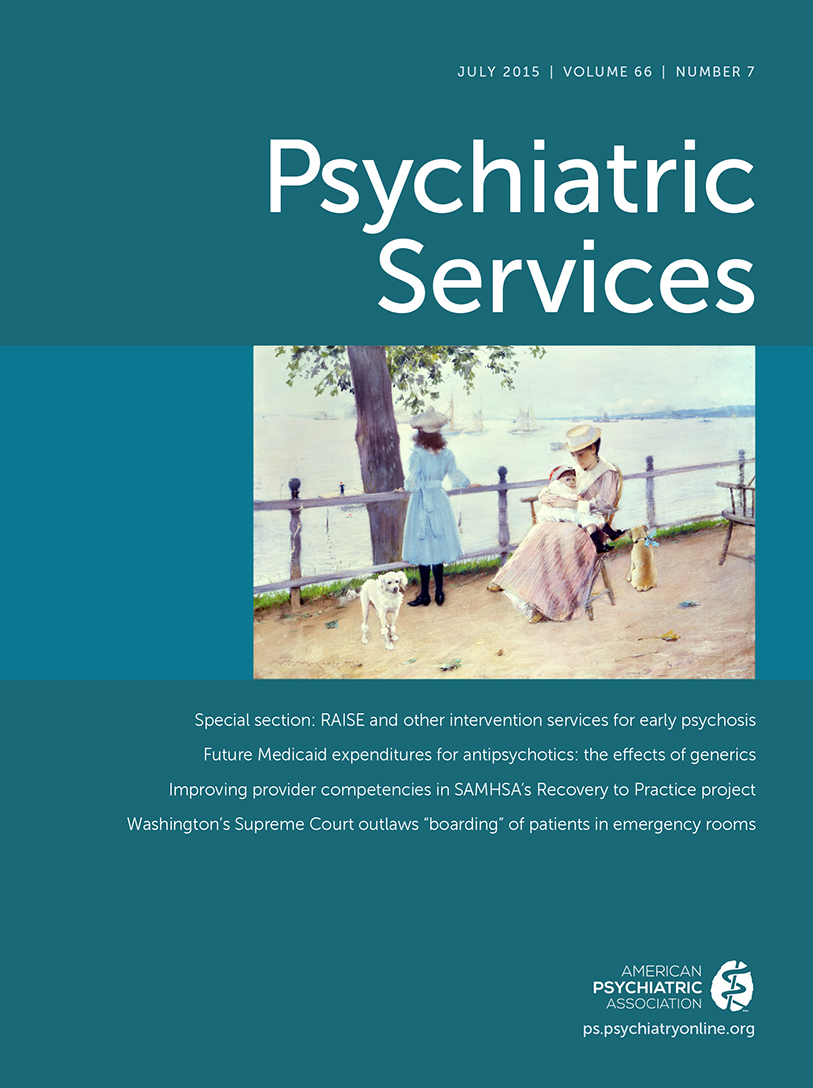Extended emergency department stays for psychiatric patients are a fact of life in most parts of the United States (
1). The phenomenon—often called “psychiatric boarding”—has been reported by emergency department medical directors to occur at least weekly in 80% of hospitals and more frequently in 55% of facilities (
2). Washington State has had a particular problem with boarding: King County, which includes Seattle, experienced a fivefold increase from 2009 to 2012, a period that overlapped with a reduction of 250 psychiatric beds in the state (
3). Thus, when the Washington Supreme Court was asked to rule the practice of boarding involuntary patients to be illegal, the suit raised substantial hopes and anxieties in the state’s medical and mental health communities.
Suing to Stop Psychiatric Boarding
Under Washington’s Involuntary Treatment Act (ITA), persons thought to be at imminent risk of harming themselves or others or who are gravely disabled as a result of a mental disorder can be held for up to 72 hours for evaluation and treatment (
4). Most such persons are initially seen in a medical emergency department, where their mental state and need for extended assessment are determined. Authorization for a 72-hour hold requires approval of a county-designated mental health professional. Once authorization is obtained, the search usually begins for a facility with an available psychiatric bed to which the patient can be transferred.
Often, however, no bed can be found. Washington ranked 48th in one survey in relative availability of mental health services (
5), and inpatient beds are at a particular premium (
6). With no place to send such patients, emergency rooms themselves typically have retained them, utilizing a mechanism that allows the state to certify the use of a bed not ordinarily approved for psychiatric treatment purposes, until an approved bed becomes available. Relying on this “single-bed certification” provision, Washington’s emergency departments held hundreds of patients per month for days or even longer, including after 72-hour emergency detention periods expired and 14 additional days of hospitalization were judicially authorized. In August 2014, for example, single-bed certifications were authorized 430 times (
7).
In early 2013, a legal action was brought on behalf of patients in Pierce County (encompassing Tacoma and adjacent areas) for whom petitions had been filed requesting 14-day extensions of their involuntary hospitalizations (
8). The patients challenged their continued detention on the grounds that holding them under single-bed certifications in emergency rooms that were not equipped to treat their psychiatric disorders violated their rights to care under the ITA. When a hearing officer agreed that the use of such certifications was unlawful, the county appealed the case, which was ultimately transferred to the state’s Supreme Court.
Vicissitudes of Boarding Patients in the Emergency Room
No comprehensive data exist on the extent of psychiatric boarding, although numerous case studies and media reports, along with the above-mentioned survey of emergency department medical directors, indicate that the practice is common (
2,
9). A report commissioned by the U.S. Department of Health and Human Services suggested that the steady reduction in the number of psychiatric beds in public facilities—and in many areas in nonpublic hospitals as well—plays an important causal role (
9). At the same time, community-based services have not developed adequately to support people with mental illnesses who could otherwise be maintained in the community. Twenty-three percent of emergency department medical directors reported that in their areas no community psychiatric resources at all were available (
2); the problem appears to be particularly severe in rural areas.
Lack of alternative services is not the only driver of psychiatric boarding. Elevated rates of admission of psychiatric patients from hospital emergency departments may also be related to unfamiliarity of emergency department staff with treatment of psychiatric disorders and thus an incorrect perception that hospitalization is necessary for stabilization and treatment. Mental health consultation to emergency departments is limited in many localities, particularly at night and on weekends, leaving medical staff with little choice but to recommend holding patients until a more thorough assessment can occur. Concern about potential liability if patients are released and come to harm—or harm others—may also motivate admission decisions (
9).
There is general agreement that prolonged stays in emergency rooms are not in the interests of most psychiatric patients. Sixty-two percent of emergency department medical directors replying to a survey indicated that no psychiatric treatment of any kind is provided to patients boarded in their emergency rooms (
2). Loud, busy environments, where care is being provided to other patients with life-threatening injuries and illnesses, are hardly optimal for psychiatric patients trying to cope with their own symptoms, which may include extreme anxiety, psychosis, and suicidal impulses. Exposés of patients spending days in such facilities recur regularly in major media outlets (
9). Thus an increase in psychiatric boarding has become a notable indicator of the failure of mental health systems to provide adequately for the care of patients.
Boarding as a Violation of Patients’ Rights
The Washington Supreme Court was well aware of the clinical problems associated with psychiatric boarding when it considered the case brought by the ten patients in Pierce County. In its opinion, it noted that the ITA itself recognized a “right to adequate care and individualized treatment” for each person involuntarily detained under the law, which requires that individuals be held in certified evaluation and treatment facilities (
8). Writing for a unanimous court, Justice Gonzalez held that the limited exception to this requirement under Washington law could not be used to avoid overcrowding certified facilities. Rather, its sole legitimate uses would be when there were medical justifications for detention outside a certified facility (for example, a treatment was available there that would not otherwise be accessible) or alternative placement was necessary to facilitate continuity of care.
Although the law recognized exceptions to the requirement for a certified facility for these limited, patient-specific reasons, the court found that single-bed certification typically took place with no inquiry whatsoever into whether a medical justification existed. Rather, it was motivated solely by “a generalized lack of room at certified facilities.” That, the court indicated, was not only a violation of the ITA—the basis on which the decision rested—but might violate patients’ constitutional rights as well. The state was ordered to stop the practice of psychiatric boarding by the end of August 2014, just three weeks after the decision was handed down. However, the state attorney general asked for a 120-day stay of the order to allow the state time to secure additional bed capacity, a request granted by the court. The mandate was thus set into go into effect on the day after Christmas 2014 (
10).
As could be expected, the prospect of no longer being able to board involuntary psychiatric patients in emergency rooms produced apocalyptic predictions. The deputy director of the state’s Department of Social and Health Services warned that more people with mental illnesses would end up homeless on the streets (
11). Mental health professionals claimed that it was “only a matter of time” before there was a bad outcome involving a patient who was a danger to self or others (
7). But the state moved to deal with the situation, and the governor immediately authorized the expenditure of up to $30 million to create additional bed capacity and proposed another $37 million in the 2015–2017 budget plan for the purpose. By March 2015, an additional 160 psychiatric beds had been created in the state, with another 60 expected to be on line by July 2015 (
7). On this evidence, the lawsuit appears to have been an effective lever to pry loose additional funding for the mental health system in a state long known for its reluctance to support what many experts would consider to be adequate levels of care.
Washington’s actual compliance with the state Supreme Court’s decision, however, is not entirely clear. In January 2015, the first full month after the decision went into effect, single-bed certifications were authorized for 290 patients, including 159 for whom no space was available in certified evaluation and treatment centers (
7). Although some patients were sent to psychiatric inpatient units, others were detained in medical facilities that claimed to be willing and able to provide mental health treatment. The medical director for behavioral health at a local medical center was quoted as saying that “such care is treatment in name only . . . nothing has changed. They’re doing what they did before, but they’re not calling it boarding” (
7). Other mental health experts claimed to know of committable patients who were released to the streets for lack of certified beds (
7). The real impact of the court’s decision in Washington State will be clear only over time.
Implications for Psychiatric Boarding in Other States
Because the Washington Supreme Court’s decision on psychiatric boarding was based on its interpretation of state law, the ruling will not directly affect practices elsewhere. Advocates, however, may look for similar provisions in the laws of their states on which to base arguments for banning such practices and may urge that the Washington case be used as a model for what their courts should do. At the very least, the Washington decision has brought renewed attention to the widespread use of psychiatric boarding and the problems it creates. That may impel states proactively to seek alternatives to the use of hallways in emergency departments for the evaluation and treatment of persons with serious mental illnesses, whether or not they are being held on an involuntary basis.
One approach that has been proposed, called the “Alameda model,” is based on a program in the Oakland, California, area that has created a regional emergency psychiatric facility (
12). Rather than holding psychiatric patients who require further evaluation in the medical emergency department, emergency physicians send them to the regional facility, where specialized care can be provided. In addition to reducing boarding, the model has reduced the percentage of patients who require admission to an inpatient facility, because with appropriate treatment many of them can be stabilized and released within 24 hours. Those involved in the system note the importance of California’s Medicaid program having a billing code for “crisis stabilization” that pays an hourly rate to the regional emergency psychiatric facility for up to 20 hours of care (
12). The absence of such a payment option in other states may limit the applicability of the model.
However it is accomplished—and other models exist (
9)—creation of a systemic response to prolonged detention of psychiatric patients in medical emergency departments will be an important part of bringing state mental health systems into the 21st century.

